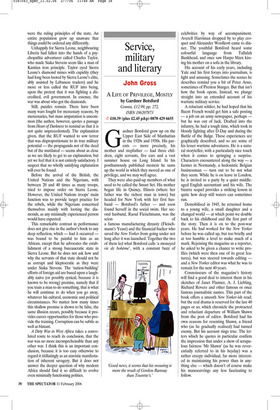Service, military and literary
John Gross
A LIFE OF PRIVILEGE, MOSTLY by Gardner Botsford Granta, £12.99, pp. 272, ISBN 186207873 ✆ £10.39 (plus £2.45 p&p) 0870 429 6655 Gardner Botsford grew up on the Upper East Side of Manhattan in the 1920s and 1930s. His parents — more precisely, his mother and stepfather — had three children, eight servants, five cars and a vast summer house on Long Island. In his posthumously published memoir he sums up the world in which they moved as one of privilege, and we may well agree.
They were also paid-up members of what used to be called the Smart Set. His mother began life in Quincy, Illinois (where her father was the richest man in town) but headed for New York with her first husband — Botsford’s father — and soon found herself in the social swim. Her second husband, Raoul Fleischmann, was the scion of a famous manufacturing dynasty (Fleischmann’s Yeast) and the financial backer who saved the New Yorker from going under not long after it was launched. Together the two of them led what Botsford calls ‘a moneyed vie de bohème’, with a constant buzz of celebrities by way of accompaniment. Averell Harriman dropped by to play croquet and Alexander Woollcott came to dinner. The youthful Botsford heard some colourful language from Tallulah Bankhead, and once saw Harpo Marx kissing his mother on a sofa in the library.
His account of his early years, including Yale and his first forays into journalism, is light and amusing. Sometimes the scenes he describes remind you a bit of Peter Arno, sometimes of Preston Sturges. But that isn’t how the book opens. Instead, we plunge straight into an extended account of his wartime military service.
A reluctant soldier, he had hoped that his fluent French would get him a safe posting — a job on an army newspaper, perhaps but he was out of luck. Drafted into the infantry, he had a tough time, which took in bloody fighting after D-Day and during the Battle of the Bulge. These experiences are graphically described, and so are some of his lesser wartime adventures. He is a natural storyteller, with a particularly nice touch when it comes to springing a surprise. Characters encountered along the way — a farmer in Normandy, a hedonistic Belgian businessman — turn out to be not what they seem. While he is on leave in London, he is invited to a party by a quiet middleaged English accountant and his wife. The bizarre sequel provides a striking lesson in quite how deep still waters can sometimes run.
Demobilised in 1945, he returned home to a young wife, a small daughter and a changed world — at which point we double back to his childhood and the first part of the story. Then it is on to the post-war years. He had worked for the New Yorker before he was called up, but too briefly and at too humble a level to make much of a mark. Rejoining the magazine as a reporter, he asked to be given a chance to write profiles (which were then one of its great features), but was steered towards editing and a New Yorker editor was what he was to remain for the next 40 years.
Connoisseurs of the magazine’s history will find a good deal to interest them in his sketches of Janet Flanner, A. J. Liebling, Richard Rovere and other famous or once famous journalistic names. This part of the book offers a smooth New Yorker-ish read; but the real drama is reserved for the last 40 pages or so, which chronicle the protracted and reluctant departure of William Shawn from the post of editor. Botsford had his own reasons for resenting Shawn, a friend who (as he gradually realised) had turned enemy. But his account rings true. The letters which he quotes in particular confirm the impression that under a show of scrupulous fairness ‘Mr Shawn’ (as he was reverentially referred to in his heyday) was a rather creepy individual, far more interested in maintaining his power than in anything else — which doesn’t of course make his manoeuvrings any less fascinating to follow.














































 Previous page
Previous page